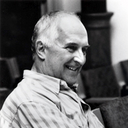

Colin Graham
- Biography
English opera director and librettist; b. Hove, Sussex, Sept. 22, 1931. He attended the Royal Academy of Dramatic Art in London (1951-52). After working as a stage manager, he directed his first opera, Britten’s Noye’s Fludde, at the Aldeburgh Festival in 1958. In subsequent years, he worked closely with Britten, becoming an artistic director at the Aldeburgh Festival in 1968. He worked with the English Opera Group, serving as its director of productions from 1963 to 1975; from 1961 he was active at the Sadler’s Wells (later English National) Opera in London, where he was director of productions from 1977 to 1982. He was also associated with London’s Covent Garden (1961-73). In 1975 he created the English Music Theatre Co., with which he was active until 1978. In 1978 he was named director of production at the Opera Theatre of St. Louis, serving as its artistic director from 1985. Graham also pursued theological studies at the New Covenant School of Ministry in St. Louis, and was ordained in 1988. He staged the first British productions of The Cunning Little Vixen (1961), From the House of the Dead (1965), and War and Peace (1972). Among the 50 world premieres he directed were Britten’s Curlew River (1964), The Burning Fiery Furnace (1966), The Golden Vanity (1967), The Prodigal Son (1968), Owen Wingrave (1972), and Death in Venice (1973), Bennett’s Mines of Sulphur (1963) and A Penny for a Song (1967; librettist), Paulus’s The Postman Always Rings Twice (1982; librettist), and Minoru Miki’s Joruri (1985; librettist), and Susa’s The Dangerous Liaisons (1994). Graham’s early training in the dramatic arts, combined with his extraordinary command of every aspect of the music theater, have placed him among the leading masters of his craft.